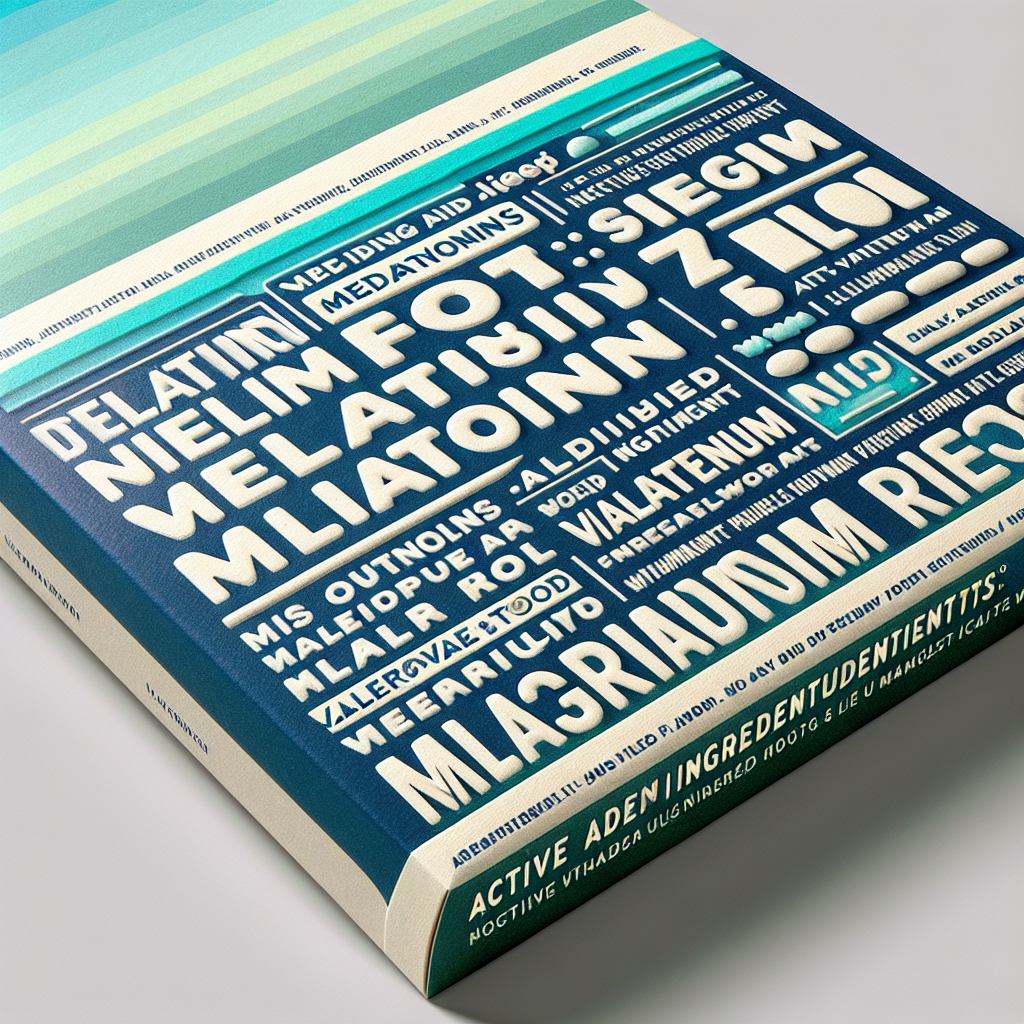In our fast-paced, always-on world, a good night’s sleep has become something of a luxury. It’s not uncommon to turn to over-the-counter (OTC) sleep aids for relief from insomnia and other sleep disturbances. While these aids can provide temporary respite, it’s important to understand both the risks and benefits they present. In this comprehensive guide, we’ll explore the landscape of OTC sleep aids and how they fit into our overall health and wellness.
Understanding Over-The-Counter Sleep Aids
OTC sleep aids typically include antihistamines, melatonin, and herbal supplements. Antihistamines, such as diphenhydramine and doxylamine, are the most common active ingredients in these medications. They work by blocking histamine, a neurotransmitter that keeps you awake, thus promoting drowsiness.
Melatonin, on the other hand, is a hormone that regulates sleep-wake cycles. As a supplement, it can help to realign your body’s internal clock, particularly in cases of jet lag or shift work. Herbal options like valerian root have been used for centuries to encourage relaxation and sleep.
Benefits of OTC Sleep Aids
The primary benefit of OTC sleep aids is their accessibility. They can be a first line of defense against occasional sleeplessness, helping to provide:
- A quicker onset of sleep
- Longer sleep duration
- Improved sleep quality
For those struggling with minor sleep issues, these aids can be a stopgap solution that doesn’t require a doctor’s visit or prescription.
Risks and Considerations
While OTC sleep aids are generally safe for occasional use, they are not without risks. Prolonged use can lead to dependency, both psychological and physical, and they may not address the underlying causes of sleep disturbances. Additionally, side effects can include:
- Daytime drowsiness
- Dizziness
- Cognitive impairment
- Dry mouth and throat
It’s also crucial to understand drug interactions, especially if you’re taking other medications. For instance, combining OTC sleep aids with medications and supplements that also cause drowsiness can lead to increased side effects or more serious health risks.
A Holistic Approach to Sleep
Before turning to OTC sleep aids, it’s worth considering a holistic approach to sleep that encompasses lifestyle changes and proper sleep hygiene. This includes:
- Establishing a regular sleep schedule
- Creating a comfortable sleep environment
- Limiting exposure to screens before bed
- Reducing caffeine and alcohol intake
For those with ongoing sleep issues, this approach should be the foundation of any treatment plan. Supplements and medications can play a role, but they’re most effective when combined with healthy sleep habits.
Sleep Aids and Overall Health
Sleep is a critical component of overall health, impacting everything from brain health to immune function. Poor sleep can lead to a host of health problems, including obesity, heart disease, and depression. Therefore, the use of sleep aids should be considered carefully within the context of long-term health goals.
Alternative Natural Supplements
For those seeking natural alternatives, there are several supplements that may help support sleep without the risks associated with antihistamines. These include:
- Magnesium, which plays a role in muscle function and recovery
- L-theanine, found in green tea, which promotes relaxation
- Omega-3 fatty acids, which have been linked to improved sleep quality
It’s important to choose high-quality supplements and to understand potential interactions with other medications or health conditions.
When to Consult a Healthcare Professional
If sleep issues persist despite the use of OTC aids and lifestyle changes, it may be time to consult a healthcare professional. They can help identify any underlying conditions, such as sleep apnea or anxiety, that may be contributing to sleep problems. In some cases, prescription medication or therapy may be recommended.
External Resources
For those interested in diving deeper into the science of sleep, the following resources offer valuable insights:
- The Sleep Foundation provides a comprehensive guide on OTC sleep aids and their effects.
- The National Center for Complementary and Integrative Health offers an overview of sleep disorders and various treatment options, including natural supplements.
- The Journal of Clinical Sleep Medicine publishes research articles and guidelines, including a study on the effects of melatonin supplementation.
Conclusion
While OTC sleep aids can be a convenient short-term solution for sleep disturbances, it’s vital to use them judiciously and in conjunction with good sleep practices. Understanding the potential risks and benefits can help users make informed decisions about their use. As with any health-related issue, consulting with a healthcare professional is the best course of action for persistent sleep problems.
Remember, sleep is a pillar of health, and its quality should be safeguarded with the same vigilance as diet and exercise. With careful consideration and a proactive approach, it’s possible to achieve restful sleep and maintain optimal health and well-being.



